Postcards from the florida republic: An independent and profitable state of mind.
Five macroeconomic trends define the 2020s.
Identifying them and knowing how to position your money according to these trends will be essential to your success.
All five embody the predicament our political leaders thrust onto us. In the post-COVID era, governments grow larger, their mistakes more perilous, and businesses face steeper challenges…
I want to (re)introduce these five trends - call them the "Five Ds of the Decade."
We'll put these in familiar terms.
If each of these trends were the major theme of a Netflix drama, we'll look at what would be the over-arching plot of the first season.
I've pitched TV shows before, so let's do a soft pitch on a show about the first trend: Deglobalization.
It's a show I'd call "Worlds Apart."
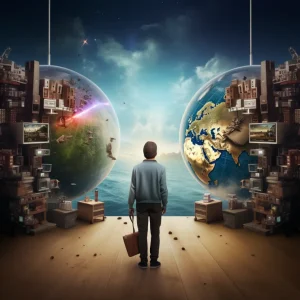
World's Apart - a Show That Will Never Happen
But first…
What Deglobalization Is (and Isn't)
The world of the last seven decades - the post-war world – was a tightly woven tapestry. Nations worked together. Globalization produced more trade and more cooperation. But now, that cloth is unraveling. Blame politicians’ pride. Blame one nation for taking advantage of others. Blame corporations paying workers abroad too little… blame social disputes… blame inflation… blame COVID… and blame a growing general dissatisfaction with the global order.
As the world turns toward deglobalization, nations would turn inward, building physical and economic walls to keep others out.
The trend of deglobalization is radical. Less trade exists, localization of supply chains becomes more important, and protectionism begins to rise. Given the inevitable constraints of the flow of supply, prices can rise, and certain goods can grow more scarce. Deglobalization is an inflationary trend.
Yet, some argue that this trend will help protect domestic industries, boost self-sufficiency, and preserve cultural identities. The world certainly feels smaller, but certain people believe that they might have more control over local issues. They may initially promote this as a means of unwinding the control of elite, unelected officials – and putting more control of decisions and resources into the hands of locals.
So, let’s explore those themes in a television show plot.
Worlds Apart - Seasons 1 Through?
At the start of the show, we'd meet the main character, let's call him David. He's a disillusioned CEO of a Fortune 500 company.
In fact, he's recently in control of the firm.
During his second annual shareholder meeting, he's confronted on his company's relationship with a foreign country that promotes substandard working conditions.
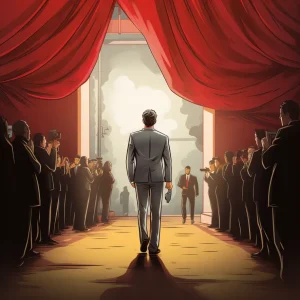
He walks out of an annual board meeting, angry about the social consequences of his globalized company. He retreats to a remote area of the United States, trying to shield himself from the consequences of the globalized world. He is the physical embodiment of deglobalization – a person who benefited most from its counterpart – and whose life will experience significant upheaval as the world fractures economically and politically.
In addition to David, we meet other characters from all walks of life. Each must manage their own struggles and aspirations in a world dominated by globalization.
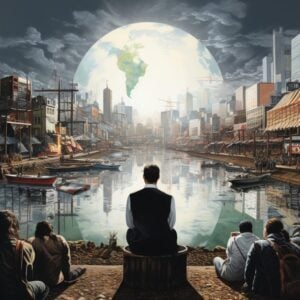
Their lives will intersect through chance encounters, unexpected connections, and shared aspirations in New York City and London. In these encounters, we see the good and bad of an interconnected, globalized world.
After establishing the theme of globalization – the good and the bad – we shift to the negative trend. We see the drawbacks of this global connectivity. Characters experience the challenges of job displacement, cultural misunderstandings, the perception of wage inequality, and the erosion of traditional, local values.
The characters will experience the complexities of these matters. We soon explore how these themes impact their personal lives and their communities. We start to see political winds shift.
Explicitly anti-mainstream voices drive momentum for political, social, and economic change. They push for more protectionism, less global cooperation. They demand greater efforts to manage local economies and compete against foreign nations that don't share the same values and interests. The world narrows.
This begins a massive unraveling of interconnectivity. It snowballs. As the story continues, deglobalization accelerates. Nations fortify borders. They rip up trade agreements. We see increasing distrust as diplomatic relationships wither.
The global economy experiences disruptions. We see trade and investment flows decline. We see characters unable to get the things that were common. We see fragmented supply chains. We see inefficiencies grow and more job losses pick up. This ripples down to the character level.
Although deeply in denial for his role in this trend, David's isolation from the world now starts to take a mental and emotional toll. He has vivid memories of human connection and yearns for them.
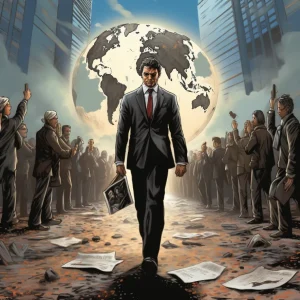
He struggles with loneliness and isolation. He looks for purpose – outside of a world that no longer needs his global leadership. He is conflicted by a desire for a simple life and the more abundant lifestyle added by cooperation, which is an inherently (any nearly exclusive) human activity that separates us from so many other animals.
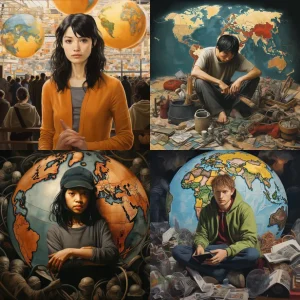
Other characters find themselves facing similar struggles to David. Their problems center around the growing breakdown of interdependence: They face the challenges of economic instability and social upheaval. They, too, yearn for a balance, with some only making the situation worse by continuing to tear down systems and social trust. Some protest. Others retreat. Other flee.
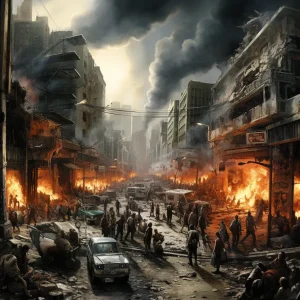
Information becomes less available, and what there is is less reliable.
The celebration of diverse perspectives declines.
Borders continue to pop up within borders. Expectations shrink. More people feel like a victim. They push away strangers to defend their little piece of the world. We discover that the deglobalized world is just as selfish as the globalized one.
In the final episodes or lifetime of the show, we find a hero.

A young woman, Maddy, who pushes for a return to stability and cooperation.
She advocates for interconnectivity. She clashes with David as we spiral toward an existential crisis facing humanity: climate, war, economic security, and other unknown threats.
This show has an open-ended conclusion. There exists no winner between the stance of David and Maddy, between deglobalization and globalization. We depart with a feeling of uncertainty, much like we feel today. Viewers must debate the realities of balancing nationalism and interconnectedness in today's world.
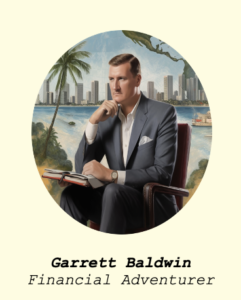 That’s all for today.
That’s all for today.
Garrett Baldwin
Florida Republic Capital (Available on Substack)
About the Author
Garrett Baldwin is a globally recognized research economist, financial writer, consultant, and political risk analyst with decades of trading experience and degrees in economics, cybersecurity, and business from Johns Hopkins, Purdue, Indiana University, and Northwestern.



